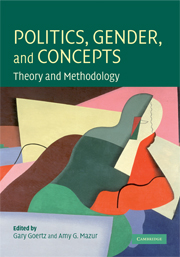Book contents
1 - Introduction
Published online by Cambridge University Press: 06 July 2010
Summary
Gender and politics researchers have been developing new and exciting concepts and modifying existing concepts since the late 1980s. Their goal has been to make research on politics better account for the realities of gender as a complex process and in doing so to make our theories and studies more accurate and scientifically meaningful; or as we say in the trade, gendering political science. Gender scholars have identified the analytical gaps in existing social science concepts, have suggested how to better incorporate gender into those concepts, and have developed new gender-specific concepts. These reflections on concepts, however, are not systematically assembled in one location. Much work is a fugitive literature, hidden in long research papers, in hard to find specialized research articles, or in chapters buried in edited books. The aim of this book is to assemble expert gender researchers to map out some of the major concepts of current politics and gender research, concepts on which they have spent a good portion of their careers working. While by no means making the claim to cover all concepts, some of the most central concepts in political science and gender and politics research are treated – democracy, representation, the welfare state, governance, development, gender ideology, intersectionality, women's movements/feminism, and state feminism.
- Type
- Chapter
- Information
- Politics, Gender, and ConceptsTheory and Methodology, pp. 1 - 13Publisher: Cambridge University PressPrint publication year: 2008
- 2
- Cited by



